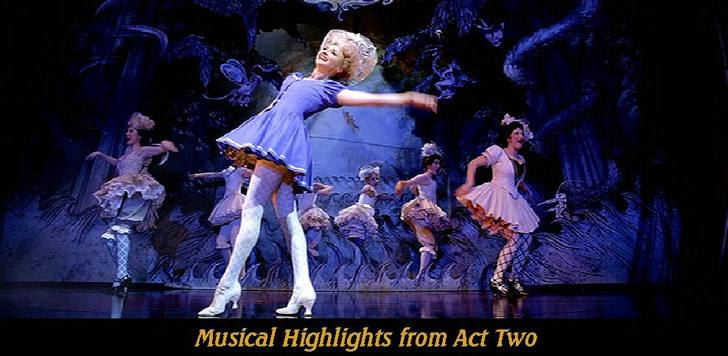Musical Highlights from Act Two
Why Does She Love Me?
|
Home Page |
|
|
|
Spring 2014 |
|
|
|
|
Simon Gleeson as Raoul gives his heart and soul to this sincere threnody, touching on crucial yet dismal points of his relationship with Christine. He has failed her throughout their marriage, and now in the cafe over much “devil drink” he expresses the melancholy of dashed hopes of being a worthy husband, and his deplorable treatment of Christine as an artiste. As he gives voice in song, “....And even when she sings, and soars above me, I try to clip her wings, why does she love me?” Gleeson makes it all so plausible that Raoul's character had descended into a cycle of drink, despair and regret over the years.
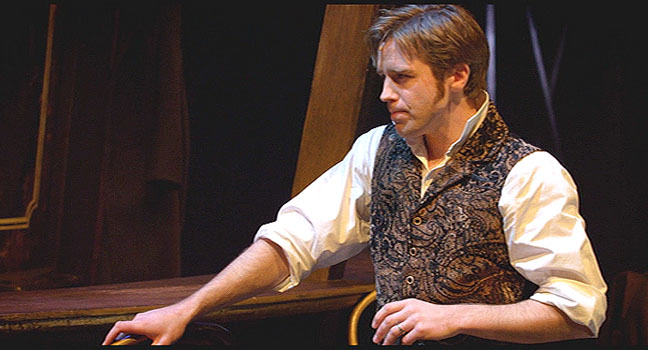
Simon Gleeson as Raoul at the cafe bar, glass in hand, forlornly asking in song, “Why Does She Love Me?”
Top all that off with his main adversary and competition for Christine's affections, the Phantom being back in the picture, Raoul has an immovable mountain to climb over in order to restore his self-respect, his marriage, and figure out how to somehow vanquish his returned nightmare of a foe. After Meg Giry appears in the cafe with a warning that he should take his family and leave (mostly for her selfish reasons of keeping Christine from the Phantom), Raoul is faced with remaining in Coney Island for his wife's career, or turning tail and running and never confronting the issue (the Phantom) that stands dauntingly between himself and her. After Meg departs, Raoul declares that he is “not afraid of him.” Then the disconcerting low staccato thrum beat of Devil Take the Hindmost begins....
Most phans, fans and critical reviewers praise this poetic epic battle of symbolic romantic titans to determine who will win Christine's love as brilliant. Operatic in the best sense of the style, Ben Lewis and Simon Gleeson are impeccable in their paces. The presentation has an underlying menace and fear, confidence and bravado, an air of Alpha male superiority, and the foreboding feel of a Punjab lasso tightening invisibly. The air bristles, the breath catches, and it is like a meeting of Rathbone and Flynn minus the duelling sabres. There is no mistaking that this song is an operatic recounting of the rivalry and jealousy between the Phantom and Raoul, who literally did cross swords in TPOTO film in 2004.
Some criticism has been raised about altering the character of Raoul to have him be gone over the edge in respect to gambling and drinking, but somehow that doesn't seem out of place. Readers of the original novel and moviegoers have long witnessed the little details of Raoul's more negative traits, and witnessed wholescale the Phantom's worst ones, with Christine hopelessly and helplessly in love with both men, and forgiving and understanding both. Raoul and the Phantom are aware of her confused heart, and each hopes to use that fact to their own advantage. The song also serves to have the Phantom plant doubts in Raoul about Christine's love, and even about the paternity of Gustave (named for Christine's father). Raoul in turn implies that Christine loves him solely for his music, and that her heart belongs to him. But, they can agree on nothing when it comes to Christine. As the clever lyrics to this song intonate, it is all or nothing for either of them. And to the devil with the loser.
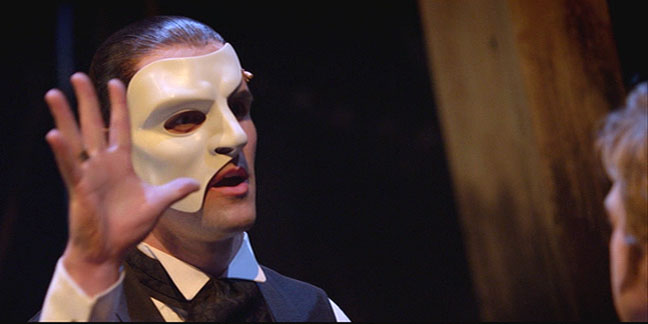
The Phantom sweetens the deal....
The lyrics to Devil Take the Hindmost:
http://www.metrolyrics.com/devil-take-the-hindmost-lyrics-andrew-lloyd-webber.html
Then comes the bet, the deal that if Christine chooses not to sing the Phantom's composition at his Phantasma concert hall, he will pay all Raoul's debts and they are free to leave. If, however, Christine chooses to sing the Phantom's aria in his hall, Raoul must leave Christine to him, and walk away without a penny, losing all. The spirited, classy duet is tautly written to the very last word sung, as Lewis and Gleeson go mano a mano and toe to toe with relish, each of their characters determined to be victorious and take the spoils. It's also a challenging physical scene, with the two shaking hands forcefully and Raoul coming to grips with his devil Phantom, Gleeson knocking down barstools, Lewis threateningly clenching his hand about rival Raoul's neck with every intent of not losing Christine to an unartistic drunkard and gambler whom he also considered to not be a real father in any way to Gustave. “Either way” it must have been gratifying to perform, and achieve such reverberating tension between their characters. A thrill and a joy to watch. The game was on....
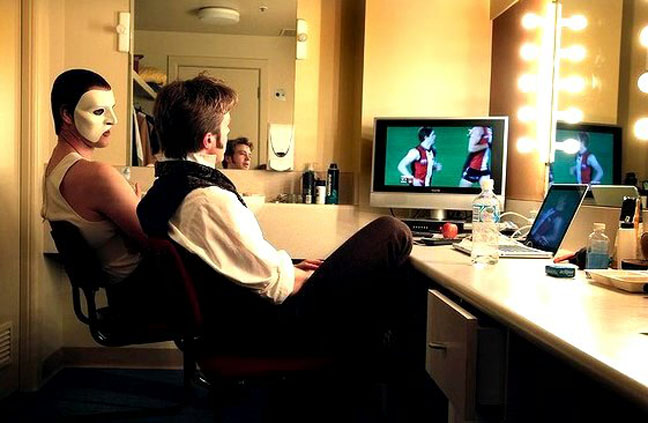
And the game really was on. The worst of enemies onstage, and friendly offstage, Ben Lewis and Simon Gleeson in the dressing room enjoying a football broadcast during the intermission (interval) of Love Never Dies. (Photo: Angela Wylie)
Bathing Beauty – Millerchip brings charm and sunshine upon the stage once again in this beach burlesque. She changes her bathing suit modestly behind fellow beachgoers with split second timing as often as she exuberantly trills and tips her toe. Accenting the fun of the engaging melody and lyrics, a punctuated astronomical vowel highnote is reached by her numerous times. One of the scene's highlights was a fabulous and flawless across-stage parasol toss by Millerchip to one of the gentleman swimmers – “Aa!”
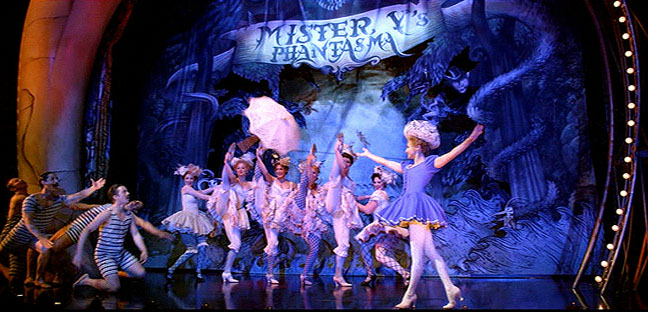
Sharon Millerchip as Meg shows how it's done, tossing the parasol in Bathing Beauties
In the “Before the Performance” scene, Christine is reminded how much she loves Gustave, and how much she is loved by Raoul and the Phantom. Raoul begs her to leave with him after the performance, Gleeson singing Just Ask it of Me with the utmost gentle expressiveness. In turn, Lewis watching them discreetly from the mirror, gives his most biting and sinister glance yet as the Phantom. With Raoul's departure for the side-stage, the Phantom emerges through the wall with gossamer curtains lifting and fluttering, as Christine tries to but is unable to unlock the dressing room door to follow after her husband. Lewis and Anna begin a skilled precise dance of panther and prey around the room, as the Phantom seeks to steer Christine's heart back to himself and what she is destined to do for him. In character, Lewis totally prevails in his quest, intimating that Raoul would never be enough man or musician to her, powerfully pleading with her in a reprise of 'Til I Hear You Sing, and gifting her with a necklace. It's an excruciating dilemma; Anna as Christine displays extraordinary emotions once again in her features and sung words, as her character feels forced to choose between her two suitors – the husband whom she thought she loved, and the former lover whom she knew she had loved on more than one level.
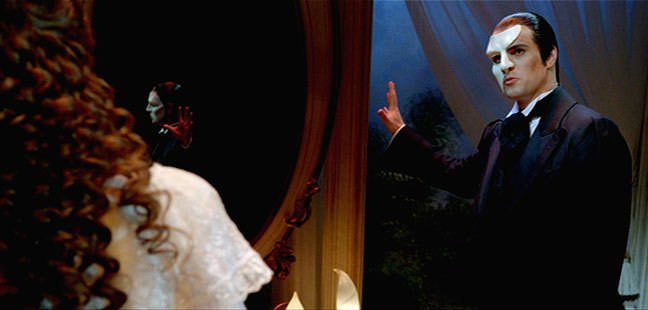
The crowds will hush, and then in one sweet rush....
The reprise of the Devil Take the Hindmost involves even higher stakes, with Raoul, The Phantom, Madame Giry and Meg each with their own motives to see the others win or lose in regard to Christine and now Gustave, who innocently vocals the tune without words in this harmony of intrigue. Lewis and Gleeson stride through the large set, both exuding confidence as their characters as to whom Christine will choose. Multiple stage apparatus and set pieces are moved around by stagehands, with larger pieces slowly swinging around in a mechanized ballet, in time with the strolling dance of the singers. By the end of the song, no has noticed that Gustave has disappeared once again.
Love Never Dies:
The theme aria is so fitting for Anna O'Byrne to sing, and in more ways than one. Totally suited to her vocal range, it also afforded her the opportunity to show some very subtle sides of her acting skills. Just as the Phantom in the opening number looked into his “empty” hands, seeing his love for Christine there still, she looks into her hands and sees, as well, that her love for the Phantom is still there. With a gentle double sweep of her lashes, her glance to the Phantom standing in the wings speaks volumes. As does his taken aback step of inwardly feeling overwhelmed that she has chosen him. Their whole history – from Leroux's book to any film or stage version of The Phantom of the Opera and Love Never Dies – and the crux – was that, from his heart, he had asked her to sing for him from her heart, of their precious love for each other that had been between them all along and would now remain. No matter what. That premise, never veered from in their saga, was almost biblical in its all-encompassing nature. Nothing in the world, in angelic realms, or the depths of hell, possessed the strength, power or incantation which could separate the love they held close for each other. True love never dies....With Ah, Christine! after she has sung the aria and he knows she has chosen him above Raoul, the Phantom now appears as more a real person than a spectre to be feared. Christine's true love had given him, finally, an identity, and humanized him. It would be a whole new journey for them from that point on.
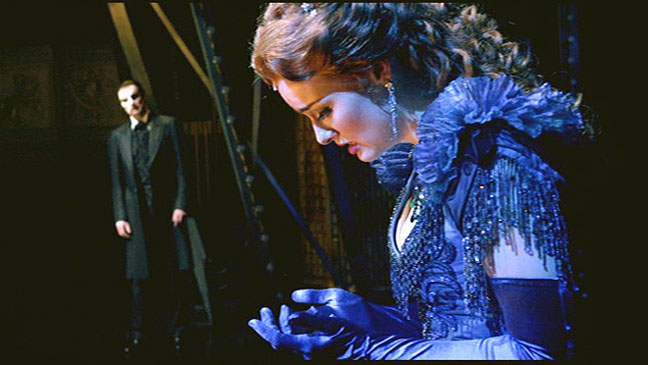
During the performance of her title aria, Love Never Dies, Christine looks down into her hands to discover....
As for the final scenes, I shall leave them entirely up to the viewers to discover for themselves all the magic, all the mystery, all that love really is. Suffice it to say that the Phantom and Christine were the keys to each others hearts forever. Love bid them enter. And within that love they shall remain....
To the critics of Love Never Dies, who seemed to rejoice in lambasting this particular Andrew Lloyd Webber show (specifically the 2010-2011 London production), it must be remembered that every Webber show, or anyone's production of anything for that matter, cannot be the largest cloud in the sky. If you measure any other show by Webber's original Phantom of the Opera musical, virtually every other production will fall short in some way. Just as there are many clouds in the sky, so too there are many shows, each with their place and time. Not every show can be a “blockbuster”, but they can all be successful on their own terms. Love Never Dies, in all its productions worldwide, and the continuing sales of the CD soundtracks and DVD featuring the Australian cast production, can indeed be considered a success. Plans are made. Plans are altered and changed.
As of March 2014, Love Never Dies was launched in Japan. Who knows what the future plans are for this Webber jewel that has been polished time and again and put under the spotlight? On March 14, 2014, it was announced on broadway.com that the show may one day come to Broadway, possibly with a new ending. Untold hearts have been touched by this new Phantom in a new century. So many have already discovered that the tale's real heartbeat and transcendental moments, thanks to Andrew Lloyd Webber and his creative team, will stand as a timeless adventure of love, drama and music. Love Never Dies, really, will truly and magically always live on ….
|top|
